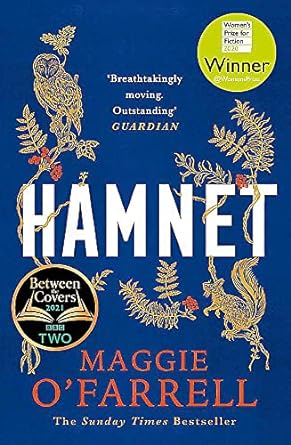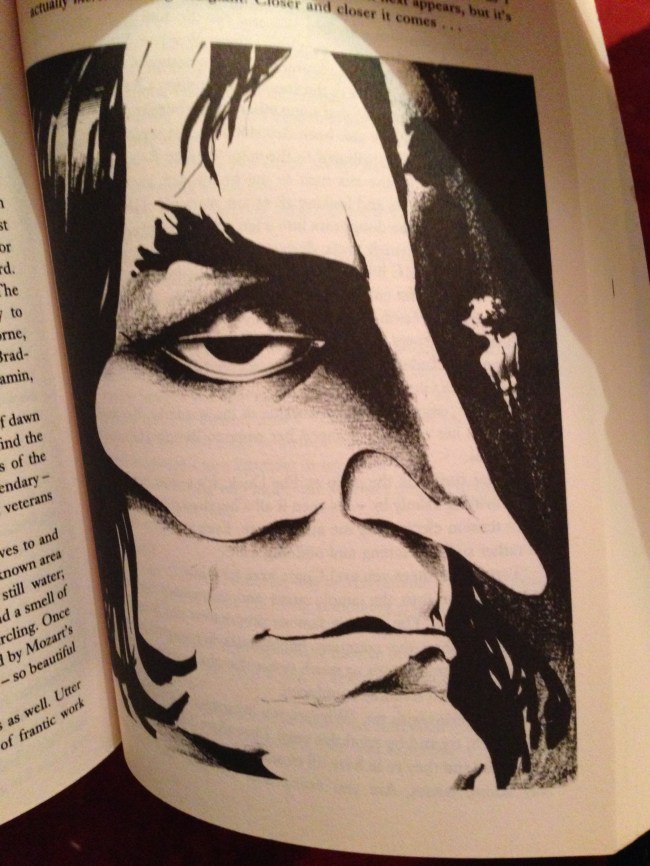Literary Wives is a quarterly online book club which considers the question: What does this book say about wives or about the experience of being a wife? You can read all about the club and its previous choices on whatmeread’s blog here. When I saw on Naomi’s blog that the December choice would be Hamnet by Maggie O’Farrell (2020) I thought this would be a great incentive to pick it off the TBR and join in!
Hamnet is historical fiction, taking the death of William Shakespeare’s only son at age 11 as its inspiration. It’s generally thought that this bereavement was the impetus behind Hamlet. But Hamnet Shakespeare had a mother too, and she is the focus of the novel:
“Every life has its kernel, its hub, its epicentre, from which everything flows out, to which everything returns. This moment is the absent mother’s: the boy, the empty house, the deserted yard, the unheard cry. […] It will lie at her very core, for the rest of her life.”
The plot moves back and forth between the present illness and then death of Hamnet, and the life of his mother Agnes Hathaway (as named in her father’s will although historical discussions usually refer to her as Anne). She is a misfit in late sixteenth-century Stratford society. She has a dowry, but her behaviour – flying hawks, understanding the healing powers of herbs, taking long walks – is problematic.
“She grows up feeling wrong, out of place, too dark, too tall, too unruly, too opinionated, too silent, too strange. She grows up with the awareness that she is merely tolerated, an irritant, useless, that she does not deserve love, that she will need to change herself substantially, crush herself down if she is to be married.”
She doesn’t have to crush herself down though, because the local Latin tutor finds her fascinating and doesn’t ask her to change.
“He is, he prides himself, adept at dissembling, at reading the thoughts of others, at guessing which way they will jump, what they will do next. Life with a quick-tempered parent will hone these skills at an early age.”
And Agnes marries into this unhappy home without quite knowing what she is getting into. She finds a way for her (never named) husband and her to survive her father-in-law’s temper and raise their three children. Like her husband, she sees and understands more than most people, although her skills come from a different source, an innate and psychic knowledge.
“They are women, mostly, and she seats them by the fire, in the good chair, while she takes their hands and holds them in her own, while she grinds some roots, some plant leaves, a sprinkling of petals. They leave with a cloth parcel or a tiny bottle, stoppered with paper and beeswax, their face is easier, lightened.”
Reading Hamnet was an interesting experience for me. I kept thinking: ‘Is this overwritten? Am I enjoying this or not?’ and for quite a while I wasn’t sure. Ultimately I decided it was overwritten but that I was still enjoying it 😀 I think this was because the overwritten aspects seemed to be an enthusiasm by O’Farrell to immerse the reader in the historical setting, rather than prove how clever she was and delight in her own brilliance. The scenes after Hamnet dies I found truly moving.
Agnes is a wonderful character, strong and fully realised. Anne Hathaway tends to be somewhat disregarded – the wife who stayed at home while her brilliant husband gallivanted around the City writing poems to dark ladies and fair youths. Hamnet makes Agnes a formidable woman while not rewriting history.
I liked the portrayal of Shakespeare too – limited contemporary accounts suggest he was good fun when he did go to the tavern, but these occasions were rare. That he was quiet and gentle, and very frugal, focussed on setting up financial security in Stratford. This is who O’Farrell has portrayed here.
What does this book say about wives or about the experience of being a wife?
The marriage in Hamnet is not always happy but it is always grounded in a deep love for one another. It is a marriage between two strongly individual people who endure tragedy and their very different ways of managing it.
Agnes doesn’t lose herself when she becomes wife. She doesn’t lose her identity within that of being Mrs Shakespeare, even though she’s married to a writer whose wider adoration is so extensive it has its own noun. Agnes is definitely not one for Bardolatry, grounded as she is by the demands of domestic family life and her own work.
Agnes marries for love the man of her choosing. Within a society that restricts women’s roles and where her skills in particular could be quite a danger for her, she perseveres along her own path. She shows how wives can be the lynchpin of a family, and the importance of unconditional love.
“What she desires is for him to stay at her side, for his hand to remain in hers. For him to be there, in the house, when she brings this baby into the world. For them to be together. What she desires, though, does not matter. He is going. She is, however secretly, sending him away.”
To end, the RSC is currently staging an adaptation of Hamnet and I enjoyed seeing the posters all over the tube as I sat there reading the book:





